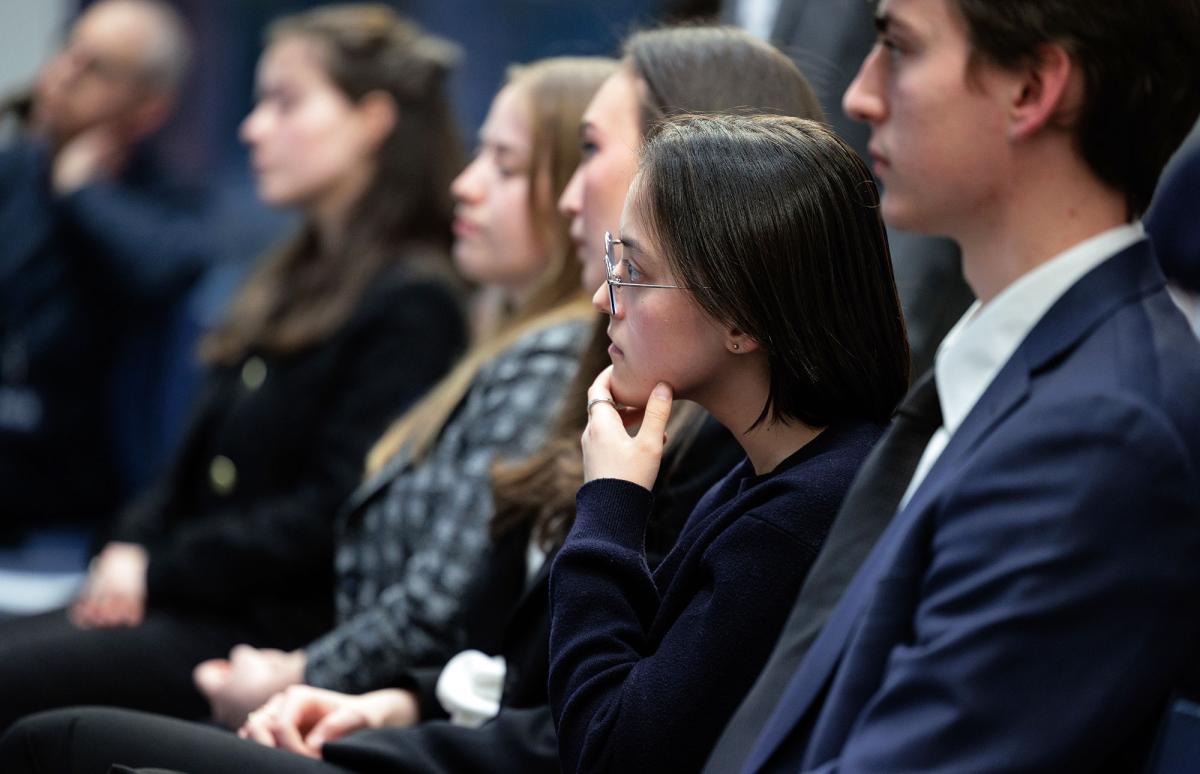
Bringing the NY Fed President to Campus: A Student-Led Pace Success Story
When Federal Reserve Bank of New York President John Williams visited Pace, it was more than a campus event. It was a student-driven moment that showcased the impact of our Economics program and the strength of our award-winning Fed Challenge team.
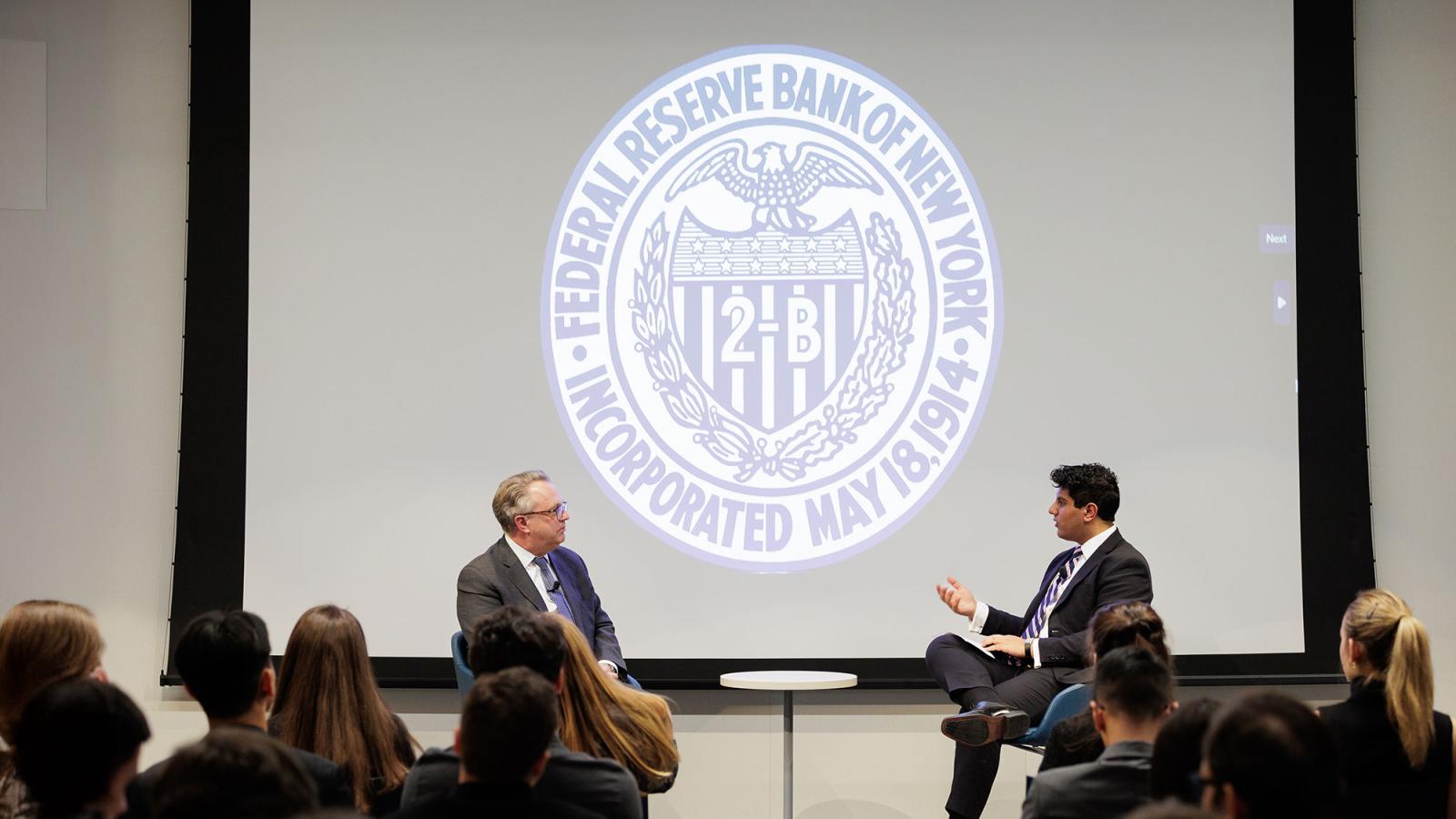
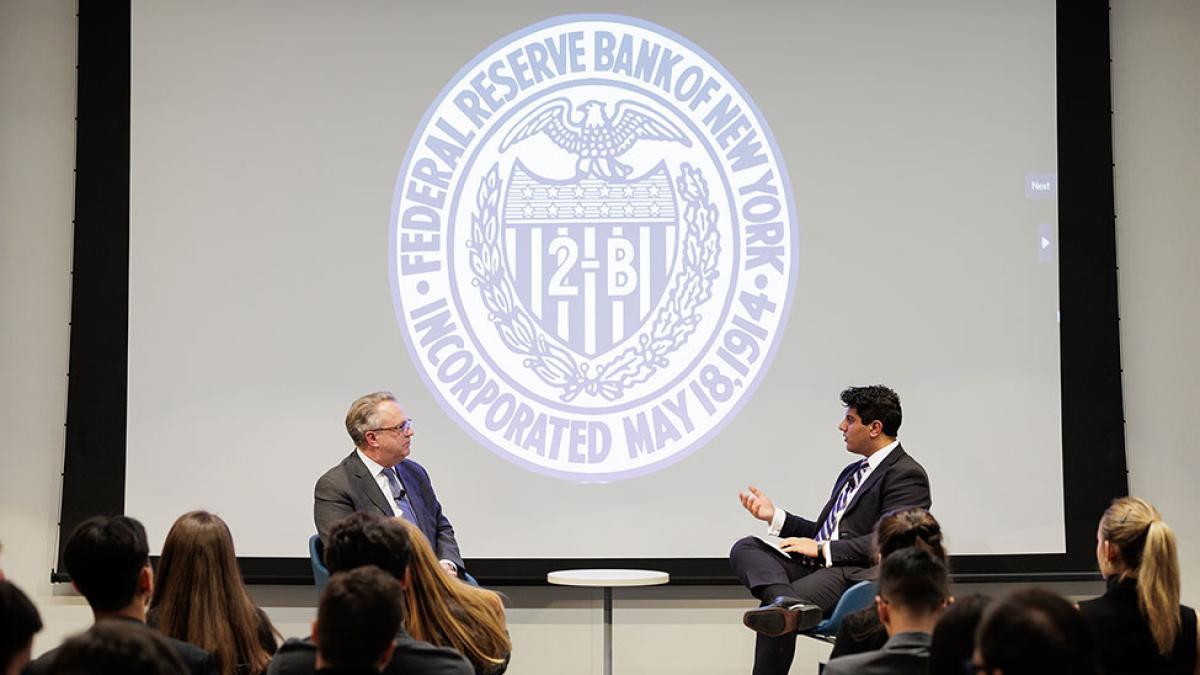
When the president of the Federal Reserve Bank of New York, John Williams, spoke at Pace University in February, it wasn’t just another campus event—it was the result of bold initiative, deep student engagement, and a passion for economics that runs deep within the Economics department and its many experiential learning offerings.
In recognition of Pace‘s consistent award-winning performance in the College Federal Reserve Challenge, Williams had accepted an invitation from Fed team co-captains Liam Chentoufi ’25, Economics, and Suraj Sharma '25, '26, Business Economics, BS/Applied Quantitative Economic Analysis, MS, with backing from Professor Gregory Colman, PhD, and Professor and Chair Anna Shostya, PhD, as well as higher administration, to come to the New York City campus.

He delivered optimistic remarks on monetary policy, inflation, and the US economy, while also acknowledging the many connections the Fed has had with Pace over the years, going beyond a shared location in lower Manhattan, and including employment of more than 100 proud alumni.
What transpired prior to his speech, however, was the icing on the cake for Pace students.
The event included a private Q&A in which Williams spoke to the Economics Society and Women in Economics student organizations (presidents Kristina Krichmaryov ’26, and Kristina Nasteva ’26, respectively, co-organized the event), in which he answered questions on both policy and his journey to Fed president—inspired by Janet Yellen, former chair of the US Federal Reserve.
Brooklyn Bynum ’26, Business Economics, BS/Applied Quantitative Economics, MS, said of the event, “Being able to speak to one of the most brilliant economists of our time was an invaluable experience. After studying the Federal Reserve's work and monetary policy in depth for the last year, it was incredible to speak to one of the people making the decisions.”
For student colleague Sharma, also a member of the Economics Society, the visit was both a significant and exemplary aspect of his Pace Path.
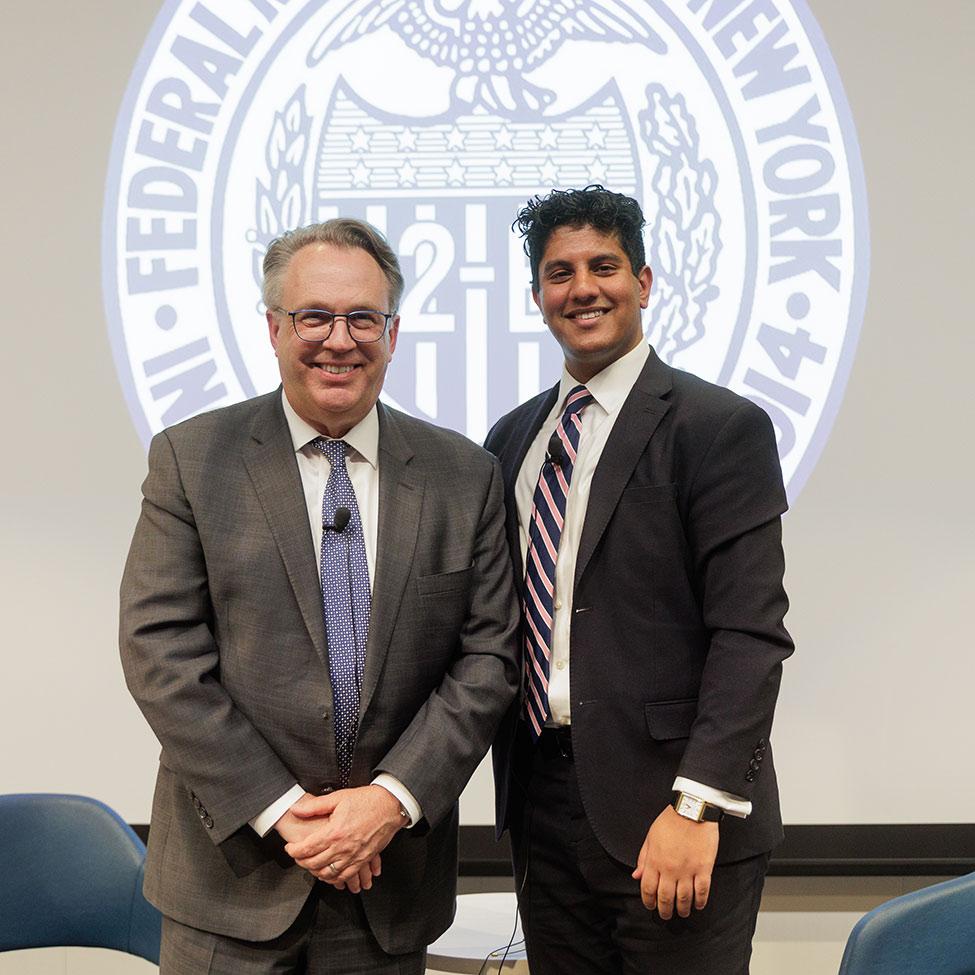
“I came to Pace because of the Fed Challenge team. It’s more than academics — it’s macro in the real world, public speaking, and research. The Fed team, Economics Society, and faculty support have defined my college experience,” he said.
Whether it is hosting prominent economists (Krichmaryov and Nasteva also brought renown labor economist Daniel Hamermesh to campus in October 2024), to placing students in top financial firms, Pace’s economics program punches well above its weight.
“We’re not an Ivy,” Colman said, “but our students are outcompeting Ivy grads when it comes to macro. And this is the most rewarding part of teaching. They’re not just learning—they’re doing.”
Pace AMA Shines on International Stage at 2025 AMA Conference
Pace AMA brought home major wins from the 2025 AMA International Collegiate Conference—top ten in the world and second place in Design Lab. They also led a session on professional development, showcasing the chapter’s commitment to real-world learning.
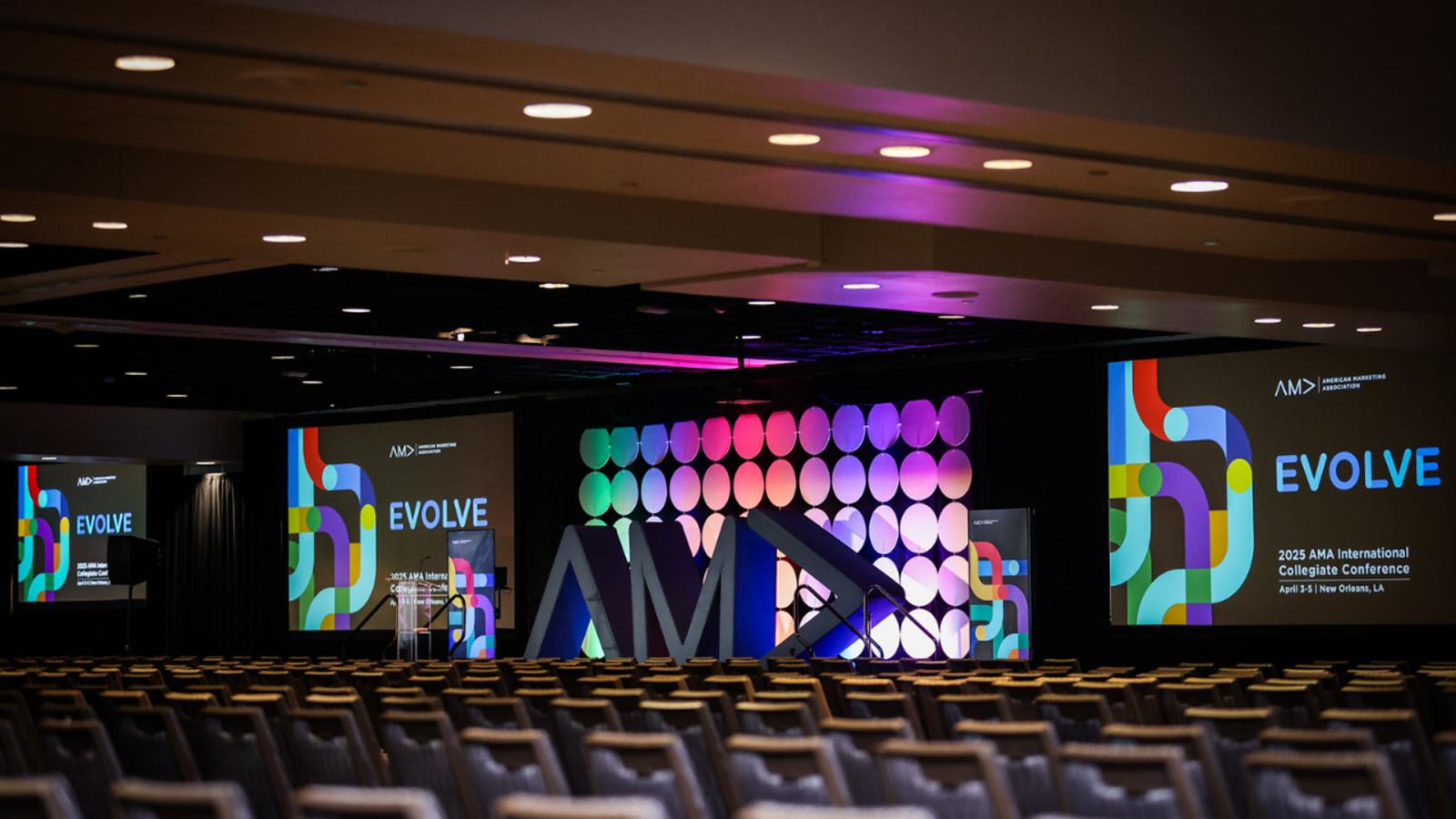
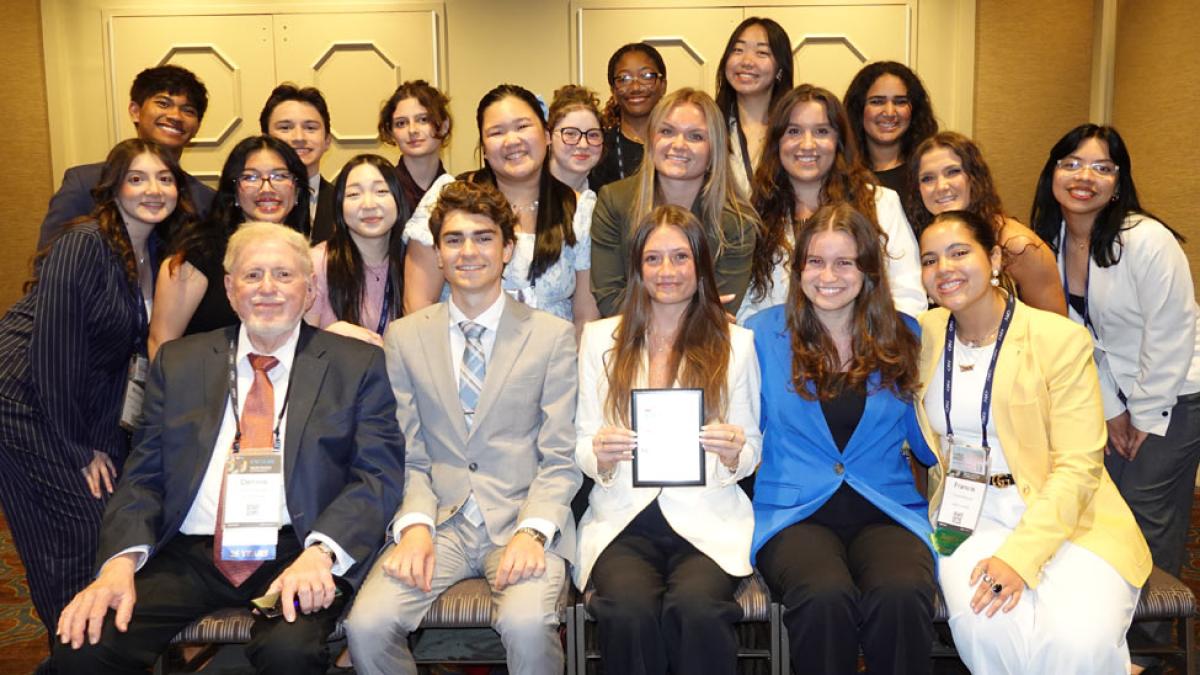
The Pace University chapter of the American Marketing Association (AMA) is proud to announce its incredible success at the 2025 AMA International Collegiate Conference in New Orleans—one of the premier events for marketing students around the globe. Competing among more than 330 collegiate chapters worldwide, Pace AMA earned a coveted spot in the Top 10 globally, and clinched second place in the Design Lab competition.
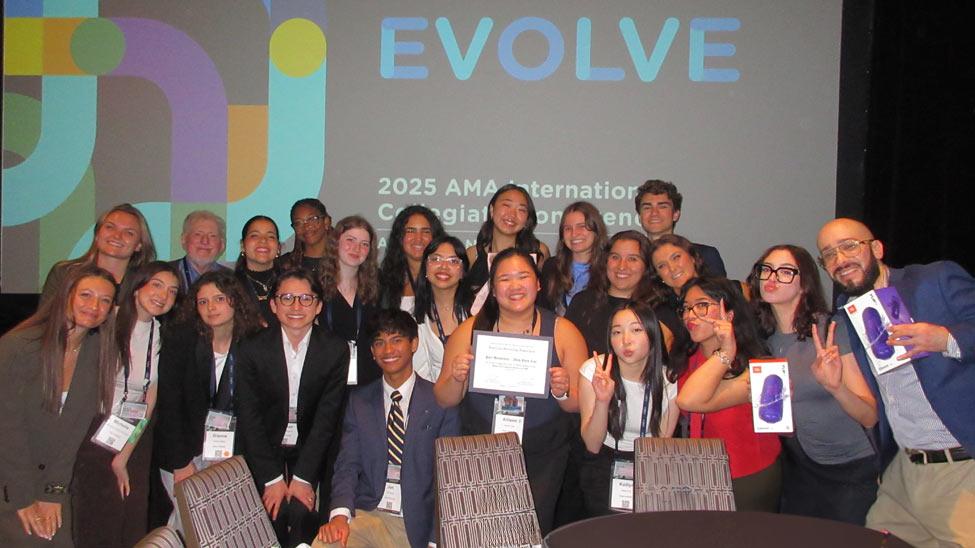
This year’s conference, themed Evolve, focused on growth, innovation, and the future of marketing. Over three dynamic days, students engaged in high-level competitions, chapter development activities, career-building workshops, and powerful networking opportunities.
Adding to their achievements, the Pace AMA chapter was also invited to present on Professional Development, showcasing their innovative approach to helping members build real-world skills through office tours, panel discussions, workshops, and curated networking events.
“Our time in New Orleans was filled with learning, growth, and connection,” said Francis Minguez '25. “We’re so proud to represent Pace on an international stage and can’t wait to bring all our insights back to campus.”
This milestone reflects Pace’s continued commitment to excellence, experiential learning, and empowering students to thrive in an ever-evolving industry. Congratulations to our Pace AMA team!
From Corporate Life to Lubin Leadership
After successful roles at KPMG, HBO, and Time Inc., Katherine Richardson, PhD, found her true calling in the classroom—and leading graduate programs at Lubin. With a passion for employee well-being and a drive to help students succeed, she brings real-world insight to every lesson at Pace.
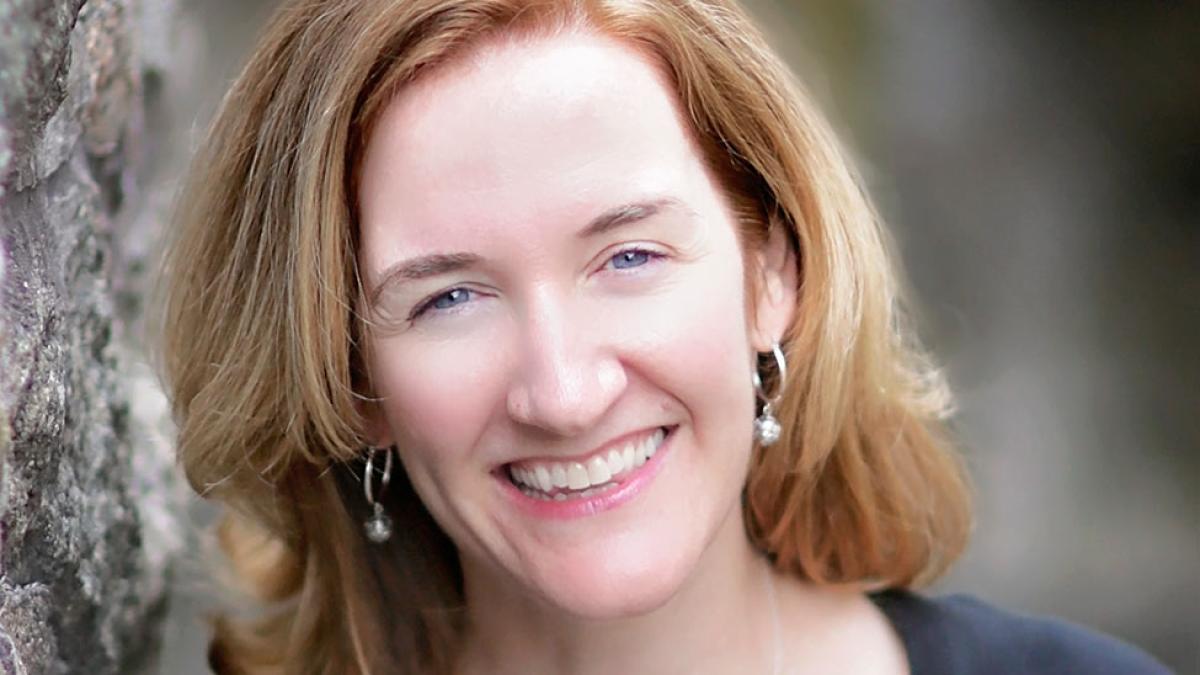
Katherine Richardson
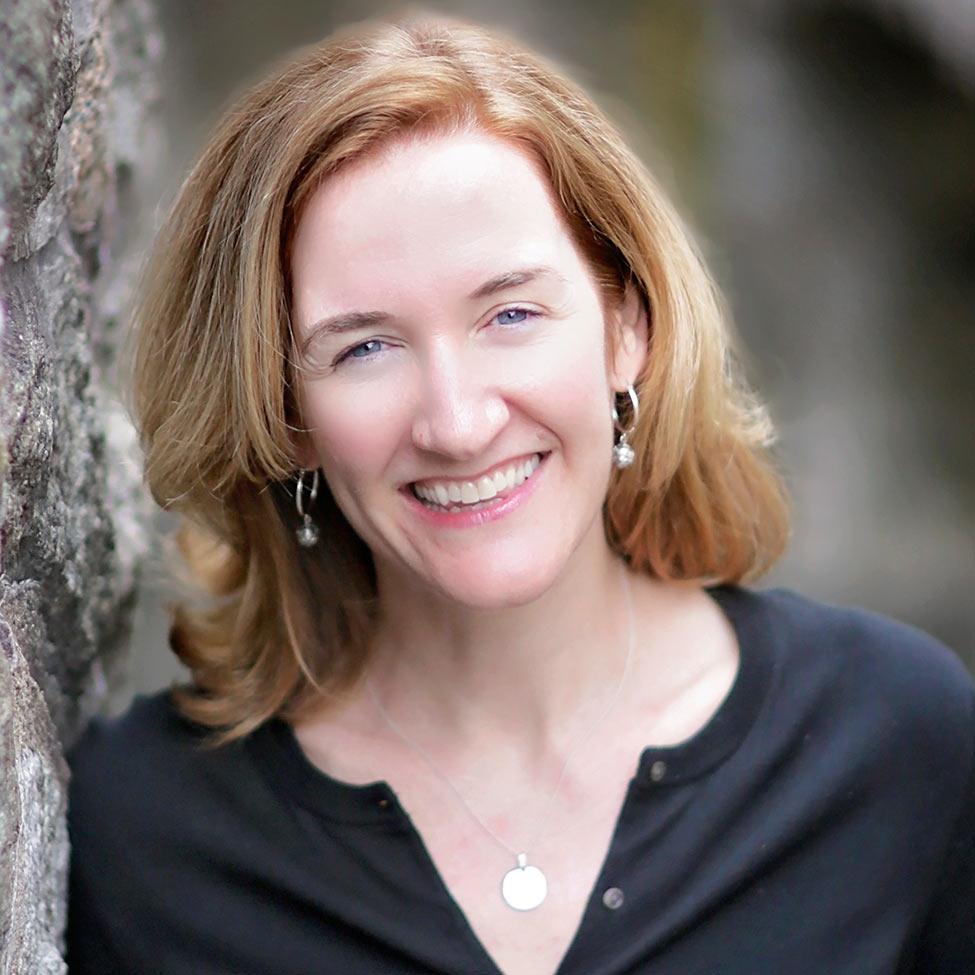
Management and Management Science Department
We caught up with Katherine Richardson, PhD—associate dean for graduate programs and professor in the Department of Management and Management Science—to reflect on her 15-year journey at Pace University. She shared how her experience in accounting, finance, and marketing informs her teaching; why she’s passionate about employee well-being; and how her path from corporate life to the classroom led her to leadership at Lubin.
Why Management?
Management is about planning and organization. I’ve always been good at that, but it’s also about people and collaboration—working together to accomplish goals. We all bring different skills and abilities to an organization, and management includes harnessing that human capital to be most effective. I’m more of a micro person, focused on organizational behavior and human resource management.
Why Lubin/Pace?
Lubin has a great location in New York City, which attracts students and faculty who want to be near the action. The city is full of energy, and so is our community. If you can make it here, you can make it anywhere!
What are your research interests/areas?
My research areas/interests are work–life balance and employee health and wellness, with an emphasis on how individuals cope with change and the related stress that may result from major life and career transitions.
Why is it important to advance research in this area or these areas?
Interest in employee health and well-being has certainly grown since the COVID-19 pandemic, and much of what we know about these topics has been built over 40-plus years of research. During the past decade, however, there’s been a significant shift in how employees work and communicate—fueled by the use of information and communications technology. It’s important to continue exploring how employees can manage workplace demands and find balance in a 24-hour connected society.
What do students learn in your classroom?
In my Negotiations courses, students learn how to prepare and plan for a negotiation, how to advocate for themselves, and how to find collaborative solutions. These skills are helpful not just for salary negotiations, but also for situations like buying a car or renting an apartment. In my Training and Development class, I ask students to think about a future job they would like and they are tasked with building a plan to get there—what should they be doing now to acquire the knowledge, skills, and abilities they’ll need?
Discuss your professional path and its impact on how you teach and what you teach. How did you go from teaching to becoming Associate Dean?
My undergraduate degree was in accounting—and my first job was as an auditor with KPMG. I learned a lot and earned my Certified Public Accountant (CPA) credential, but I also realized I didn’t want to continue working in public accounting. I left KPMG and took a position with HBO as a financial analyst. The less demanding work hours gave me the opportunity to pursue a Master of Business Administration (MBA) degree part-time while still working. I focused on marketing so I could broaden my skills beyond accounting and finance.
Midway through my MBA, I left HBO and went to work for the People magazine division of Time Inc. This was during the tail end of the glory days of print publishing, and that job was a lot of fun! I worked on the launch of Teen People magazine in their consumer marketing division—essentially direct marketing to grow the subscriber base and manage newsstand sales. I got to work on a commercial featuring NSYNC and a very young Justin Timberlake—lol!
I enjoyed Time Inc., but after earning my MBA, I realized I wanted to further my business education by pursuing a Doctor of Philosophy (PhD) with the intention to teach at a university. I’ve always liked learning and being around other curious people. I chose to focus my doctoral studies on management, which I felt had application to any business discipline. My corporate work experience in accounting, finance, and marketing has made me a bit of a jack-of-all-trades—which can be helpful as an Associate Dean.
What are some challenges you had to overcome to get to where you are today?
Finding balance in my work and home life was a challenge. It’s difficult at times to be a working parent, but academia can provide more flexibility than other jobs. It helps to have a supportive partner and a community of friends and colleagues you can rely on when necessary. You don’t have to do it alone.
Of which triumph are you most proud?
I’ll focus on a professional triumph—the first academic paper I ever published won the Best Paper Award for that journal. It was a meta-analysis on stress management interventions. I’m particularly proud of it because the paper began as a class assignment in one of my doctoral classes. A professor in another course dismissed the idea of organizations caring about the stress levels of their employees. But at the encouragement of my doctoral advisor and co-author, I stuck with the topic and continued working on the paper after the course ended. I went on to present it at a conference, and not only was it published in the Journal of Occupational Health Psychology, but it won the Best Paper Award for 2008–2009. The meta-analysis has over 2,100 citations and still garners more than 100 citations per year. Clearly, it struck a chord.
What is the single most important lesson you’d like to impart to your students?
Don’t stress! I know students have a lot of worries about passing their courses and finding a job, but it’s going to work out. And if you wind up in an organization or profession that you don’t like—change. People can have several careers over their lifetime. I’m already on my third and counting—so don’t feel stuck in any job, and never settle. Learn something new and move on!
What does #LubinLife mean to you?
#LubinLife means we’re all connected in this great community. We come from diverse backgrounds and have expertise and interest in different fields, but we share a common goal of Opportunitas. We are stronger together!
Courses Professor Richardson teaches:
- BUS 101: Contemporary Business Practice
- MGT 365: Managerial Negotiations
- MGT 363: Training and Development
- MGT 150: Managerial and Organizational Concepts
- MGT 650: Negotiations and Bargaining
- MGT 683: Training and Development
- MGT 685: Recruitment and Staffing
- MGT 835: Seminar in Organizational Behavior
Elisabeth Haub School of Law at Pace University Professor Margot Pollans Explores “Inundations” in Thought-Provoking James D. Hopkins Memorial Lecture
Professor Margot Pollans delivered the James D. Hopkins Memorial Lecture on Monday, April 21, on "Inundations: Pain, Bodies, and the Law." Dean Horace Anderson appointed Professor Pollans as the James D. Hopkins Professor of Law for the 2023–2025 term. During the holder's term, the James D. Hopkins Professor delivers a lecture that is open to the entire law school community and members of the public.
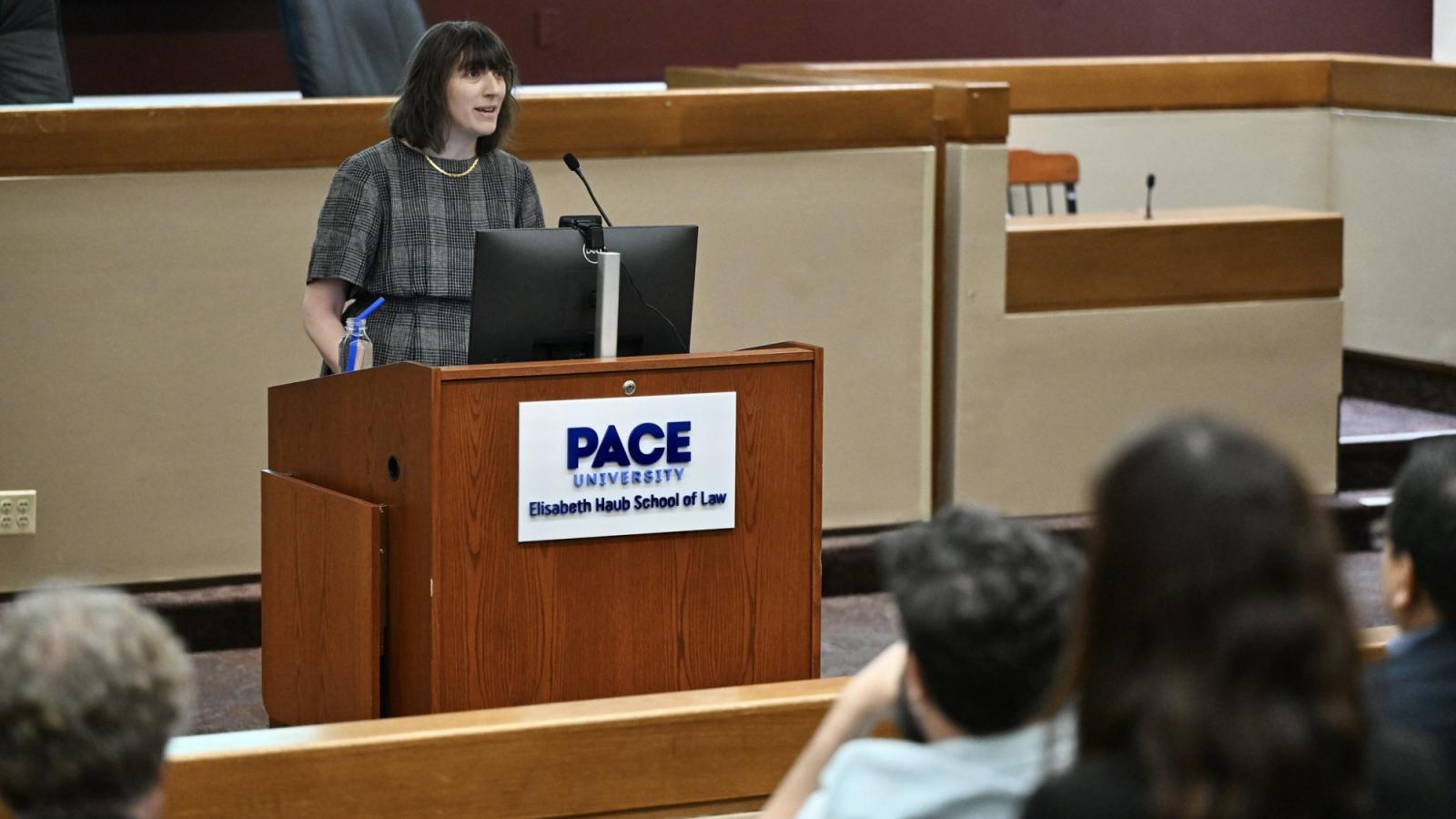
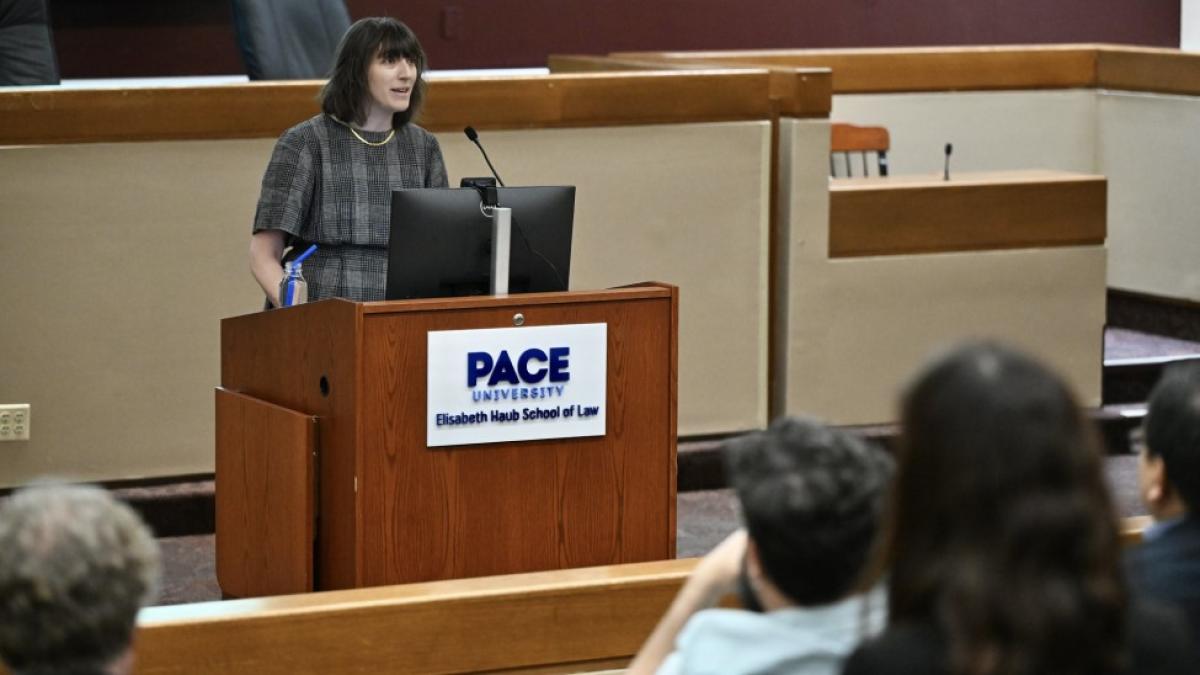
Professor Margot Pollans delivered the James D. Hopkins Memorial Lecture on Monday, April 21, on "Inundations: Pain, Bodies, and the Law." Dean Horace Anderson appointed Professor Pollans as the James D. Hopkins Professor of Law for the 2023–2025 term. During the holder's term, the James D. Hopkins Professor delivers a lecture that is open to the entire law school community and members of the public.
Professor Pollans opened her lecture outlining the different contexts in which people experience physical inundation such as toxic exposure, gun violence, radiation, and noise. “How well legal regimes responds to this condition is, to me, a really important metric of good governance,” she explained. “Here in the United States, inundation management does not paint a picture of good governance, and it has not for a very long time. Instead, for decades, it has been priming us to become fascists subjects.”
Professor Pollans defined inundation and made the case that it is an essential unit of analysis. She offered a taxonomy of regulatory approaches to inundation, explaining that little current law prevents inundation. Instead, it facilitates individuals who want to protect themselves. And, finally, she explored the consequences of these approaches for both individuals and regulators. Throughout her lecture, Professor Pollans offered specific examples of inundation, many of which translate into our everyday life. She observed that, “[i]nundation includes a broad range of harms, but what they all have in common is that they all flow from the permeability of the human body.”
Professor Pollans concluded her remarks with the following words: “For as long as bodies remain permeable, physical inundation remains a critical unit of analysis for human experience. Permeability creates mutual dependence. Self-shielding serves primarily to drive us further apart. We have only to look at the long-term effects of covid lockdown to see a society-wide experiment with this phenomenon. Resisting fascism will require profound collective action. Shield and cleanup regimes did not cause fascism, but I do think that they have weakened our capacity for collective action. I invite you to prove me wrong.”
Professor Margot Pollans joined Haub Law’s faculty in 2015. She is the Faculty Director of the Pace Food Law Center and, during her time at Haub Law, Professor Pollans has been a leader in building the national reputation of the Pace Food Law Center. She is currently the Joseph P. D’Alessandro Faculty Scholar and previously, she served as the Shamik and Adrienne Trivedi Faculty Scholar from 2020–2022. She teaches several classes including Agriculture Law and the Environment, Food Systems & the Environment, and Administrative Law.
Professor Pollans is an accomplished scholar whose primary research interests lie in the areas of food and agriculture law, administrative law and social justice. Her academic work has appeared in a variety of journals including in the California Law Review, Michigan Law Review, the Ohio State Law Journal, the Columbia Journal of Gender and Law, and the Harvard Environmental Law Review. She is also the co-author of a casebook, Food Law: Cases & Materials. In 2022, she was named the recipient of Haub Law’s distinguished Goettel Prize for Faculty Scholarship for her article, "Eaters, Powerless by Design" published by Michigan Law Review (120 Mich. L. Rev. 643 (2022)).
The title of James D. Hopkins Professor of Law is awarded to a member of the faculty for a two-year term in recognition of outstanding scholarship and teaching. The designation is among the Law School’s most significant faculty honors. The Hopkins Professor is selected by the Dean in consultation with the former holders of the Hopkins Chair. The prior James D. Hopkins Professor of Law for the 2021–2023 term was Professor Noa Ben-Asher.
From a Night at the Museum to Days at Haub Law
Meet Jacob Cherry, a 1L at Haub Law whose path to legal education is anything but typical. As a child actor, Jacob shared the screen with stars like Ben Stiller in Night at the Museum—but today, he’s traded in his SAG card for his Pace Library Card where you’ll find him studying for his Contracts, Civil Procedure, and Torts classes.
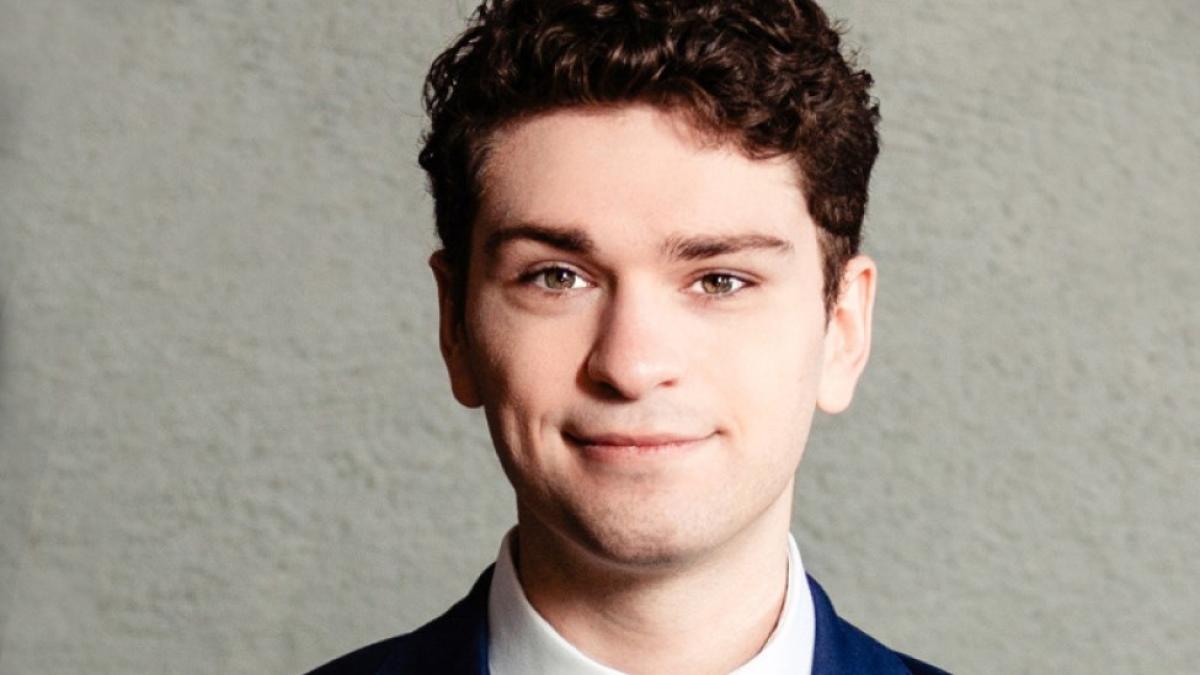
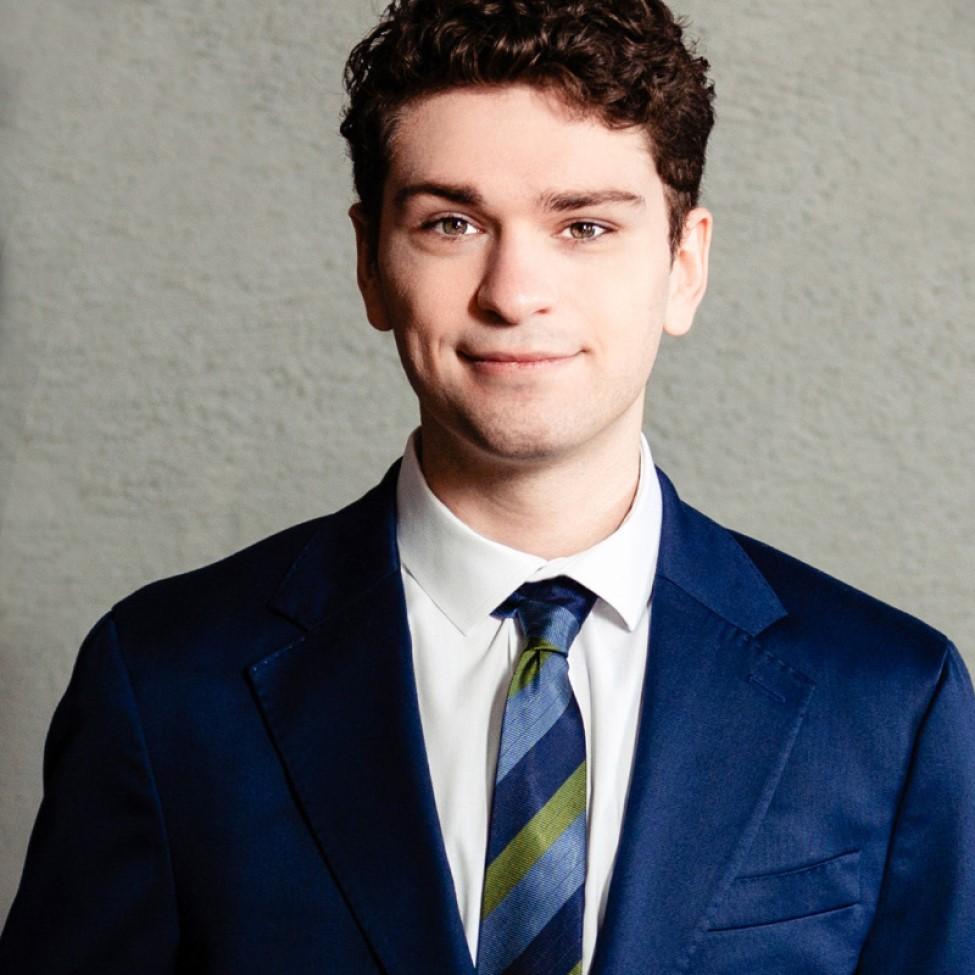
Meet Jacob Cherry, a 1L at Haub Law whose path to legal education is anything but typical. As a child actor, Jacob shared the screen with stars like Ben Stiller in Night at the Museum—but today, he’s traded in his SAG card for his Pace Library Card where you’ll find him studying for his Contracts, Civil Procedure, and Torts classes.
Originally from New Jersey, Jacob spent much of his youth traveling between New York and Los Angeles for acting. But when he started thinking differently about his future, it was his visit to Haub Law’s Accepted Students Day that sparked a new passion.
“Based on the energy and attitude of the faculty and students, I was immediately drawn to Haub Law,” shared Jacob. “The focus on camaraderie here really spoke to me—it set the school apart.”
Since starting law school, Jacob has fully embraced the Haub Law community. He joined SEALS (the Sports, Entertainment, and Arts Law Society) and was elected as a 1L representative. He regularly connects with classmates through study groups and even launched a Dungeons & Dragons campaign, creating a fun and collaborative space for students to unwind and bond outside of class.
Jacob has also found meaningful mentorship by taking advantage of office hours with his professors, who are always willing to discuss course materials or provide advice on his career goals. Those conversations, he says, have been instrumental in shaping his early experience at Haub Law.
Looking ahead, Jacob is interested in litigation and trial advocacy, and excited to be taking Entertainment Law next semester—all skills that align with his previous experience as an actor and will provide a chance to blend his past and present in meaningful ways.
Jacob was recently featured in People magazine about his journey from film sets to the halls of law school, written by another Haub Law student, 1L Flex student Tereza Shkurtaj.
Higher Education’s AI Imperative: Why Universities Must Lead
Pace President Marvin Krislov pens an op-ed in Forbes, calling on higher education institutions to lead the AI revolution with purpose, access, and equity. He highlights how Pace is embedding AI across disciplines—from first-year courses to senior capstones—and urges universities to make AI literacy a core part of academic and operational strategy.
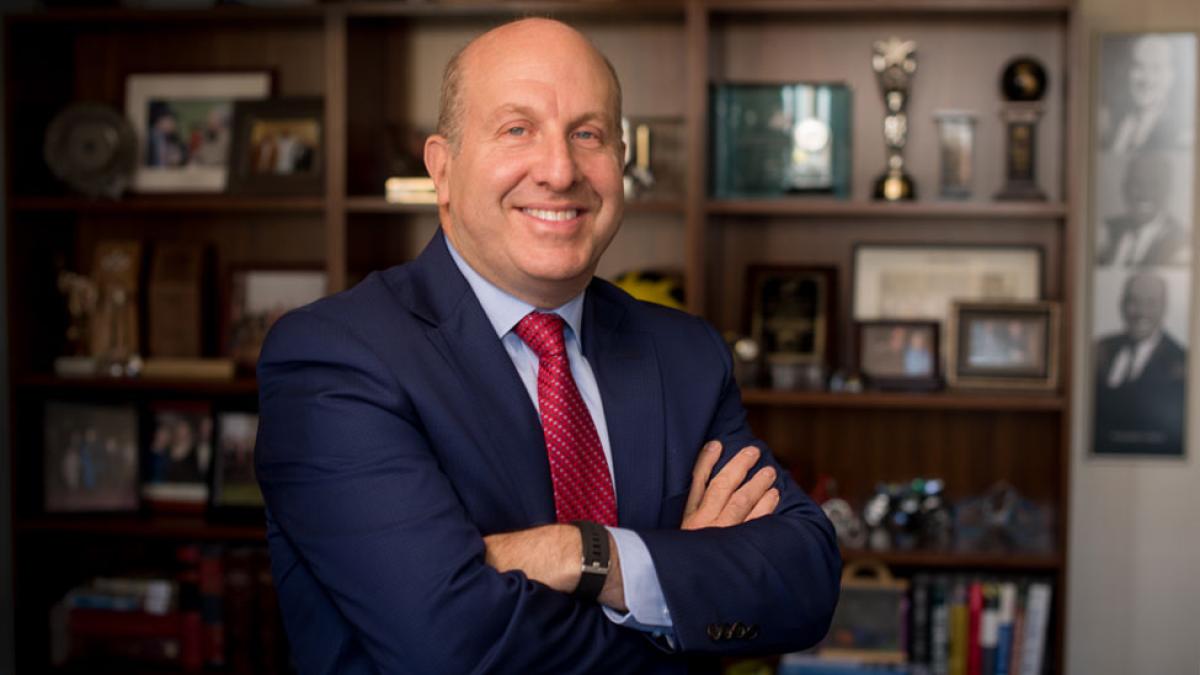
Congestion Pricing Tolls Remain On Despite Federal Government’s Deadline
Haub Law Professor Bennett Gershman provides an expert analysis to PIX11 on congestion pricing authority.
Defense Secretary Pete Hegseth Shares Yemen Attack Details In Second Signal chat
Elisabeth Haub School of Law Professor John Bandler speaks to Spectrum News NY1, breaking down the legal and cybersecurity implications of leaked messages from Defense Secretary Pete Hegseth’s Signal chat.
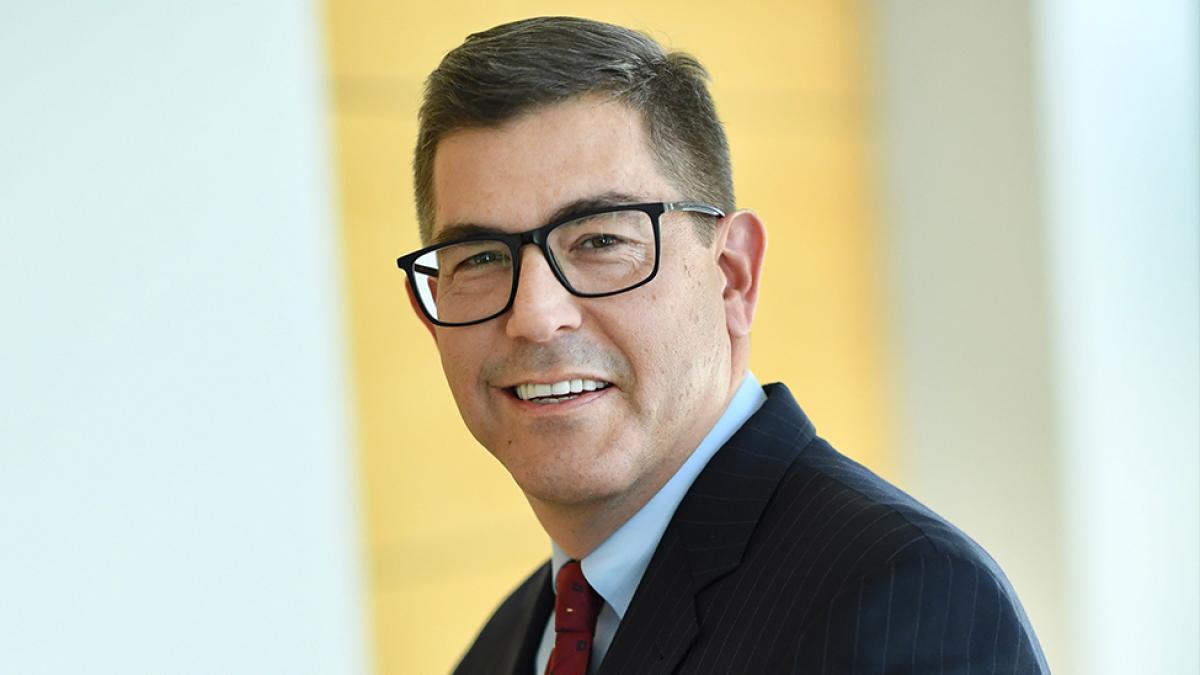
South Korea Deeply Divided Ahead Of June Election
Dyson Professor Seong Jae Min examines the roots of South Korea’s deep political polarization ahead of the June election with DW.
What Trump’s Assault on Law and Lawyers Means for Law Schools
Professor Gershman writes a piece in the New York Law Journal exploring the erosion of legal norms and the threats facing law schools today.